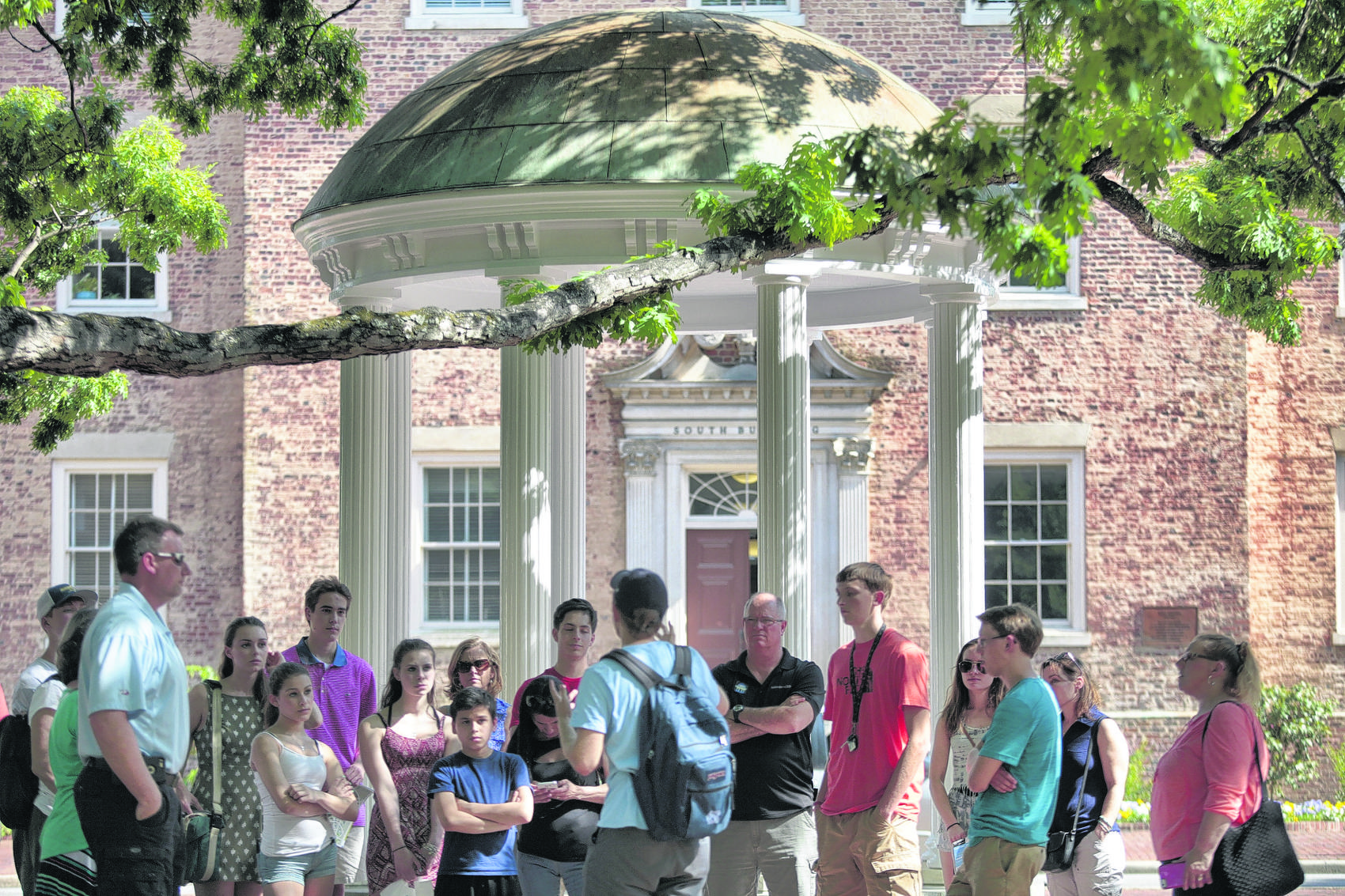
News & Observer file photo
A tour group of parents, future students and family members learn the history of UNC’s Old Well on the Chapel Hill campus.
The U.S. Supreme Court will weigh in on whether colleges and universities can consider race in admissions as it agreed to hear a case brought by an anti-affirmative action group against UNC-Chapel Hill.
The group, Students for Fair Admissions, alleges UNC-CH discriminated against white and Asian American applicants by using race as a factor in its undergraduate admissions process.
The justices will also hear a similar case against Harvard University brought by the same group. The court consolidated the two cases Monday, allotting a total of one hour for oral arguments.
The outcome of these cases could have sweeping implications for affirmative action in higher education and diversity of student bodies on campus. And with the court becoming more conservative in recent years, the fate of race-conscious admissions is in doubt.
UNC-CH has defended its admissions process in this legal battle for several years.
“We look forward to defending the University’s holistic admissions process before the U.S. Supreme Court,” Associate Vice Chancellor for University Communications Beth Keith said in a statement. “As the trial court held, our process is consistent with long-standing Supreme Court precedent and allows for an evaluation of each student in a deliberate and thoughtful way.”
Supreme Court could diverge from precedent
The fact that the court is hearing the case may signal that the court may change course from where it’s stood on the issue for decades and diverge from its own precedent, according to law professor Carl Tobias. He is the Williams Chair at the University of Richmond School of Law, where he specializes in federal courts and constitutional law.
In previous cases related to affirmative action and race-based admissions, justices ruled that universities could use race in admissions, but with caveats or limitations in the scope of how it’s used.
In the recent, high-profile case Fisher v. University of Texas at Austin, the court upheld UT-Austin’s policy and ruled that race could be considered in undergraduate admissions decisions. The ruling also set the “strict scrutiny” standard in using race or ethnicity in admissions and said it must be narrowly tailored to achieve a compelling state interest.
“It’s not like an open-ended ticket ... they’ve been saying it has to be used with care,” Tobias said.
Now there are questions about how three new justices appointed by President Donald Trump — Neil Gorsuch, Brett Kavanaugh and Amy Coney Barrett — will rule, Tobias said.
While the Harvard and UNC cases will be consolidated, the two universities face somewhat different legal guidelines, The New York Times reported. Harvard is a private university and must comply with a federal law that bans race discrimination as a condition of receiving federal money, while UNC must also satisfy the Constitution’s equal protection clause because it’s a public university.
There’s a possibility that the justices will rule differently as to public and private institutions, Tobias said.
Judge ruled in UNC’s favor
Carolina’s case stems from a 2014 lawsuit against UNC by Students for Fair Admissions, which claims UNC unfairly prioritizes Black and Hispanic students over white and Asian American students. The group is made up of thousands of rejected applicants, prospective students and parents who want race and ethnicity taken out of the college admissions process.
A trial ended in November 2020 in the U.S. District Court for the Middle District of North Carolina in Winston-Salem. About a year later, a federal judge ruled in UNC-CH’s favor.
Judge Loretta Biggs ruled that UNC’s use of race in its admissions process “stands strict scrutiny and is therefore constitutionally permissible.”
UNC argues a student’s race is important, but not a dominant factor in its admissions process because the school also considers GPA, test scores, class rank and essays. The university has said it does not have racial quotas or formulas, and identifying a student’s race in the application process helps improve diversity on campus and enhances the academic experience.
Students for Fair Admissions says UNC uses race as a primary factor and in a mechanical way, giving African American and Hispanic applicants an advantage over their peers.
One of the group’s group’s key witnesses is Peter Arcidiacono, a Duke University economics professor who analyzed and predicted UNC’s admissions data. SFFA lawyers argue his statistical analysis shows how African American and Hispanic students are admitted at higher rates compared to white and Asian American students.
One example of Arcidiacono’s findings is that a male applicant from North Carolina would have a 25% chance of getting into UNC if he were Asian American, a 67% chance if he were Latino and and about a 90% chance if he were African American.
The group also criticized UNC’s efforts to find workable alternatives to improve racial diversity on campus.
In her ruling, Biggs said UNC uses a “highly individualized, holistic admissions program” when deciding who gets in and considers race as one of many factors for each applicant. The university’s admissions team has also seriously considered race-neutral strategies, including with recruiting, financial aid and admitting more transfer students, she said.
At the time of the ruling, Students for Fair Admissions’ president Edward Blum vowed to appeal the decision to the U.S. Supreme Court, if necessary. He told The New York Times that they would “ask the justices to end these unfair and unconstitutional race-based admissions policies.”
The cases likely will be argued next term, according to the website SCOTUSblog.
Kate Murphy: 919-829-4842, @KateMurphyNews